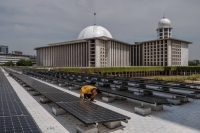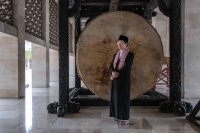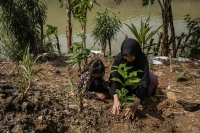The faithful gathered in an imposing modernist building, thousands of men in skullcaps and women in veils sitting shoulder to shoulder. Their leader took to his feet and delivered a stark warning.
"Our fatal shortcomings as human beings have been that we treat the Earth as just an object,” Grand Imam Nasaruddin Umar said. "The greedier we are toward nature, the sooner doomsday will arrive.”
Then he prescribed the cure as laid out by their faith, which guides almost one-quarter of humanity. Like fasting during Ramadan, it is every Muslim’s fard al-ayn, or obligation, to be a guardian of the Earth.
Like giving alms, his congregants should give waqf, a kind of religious donation, to renewable energy. Like daily prayers, planting trees should be a habit.
The environment is a central theme in the sermons of Nasaruddin, the influential head of the Istiqlal Mosque in Jakarta, Indonesia, who has tried to lead by example.
Dismayed by the trash sullying the river that the mosque sits on, he ordered a cleanup. Shocked by astronomical utility bills, he retrofitted Southeast Asia’s largest mosque with solar panels, slow-flow faucets and a water recycling system — changes that helped make it the first place of worship to win a green-building accolade from the World Bank.

The grand imam says he is simply following the Prophet Muhammad’s instructions that Muslims should care about nature.
He is not alone in this country of more than 200 million people, the majority of them Muslims, in trying to kindle an environmental awakening through Islam. Top clergy have issued fatwas, or edicts, on how to rein in climate change. Neighborhood activists are beseeching friends, family and neighbors that environmentalism is embedded in the Quran.
"As the country with the largest number of Muslim people in the world, we have to set a good example for Muslim society,” Nasaruddin said in an interview.
While other Muslim nations also have strains of this "Green Islam” movement, Indonesia could be a guide for the rest of the world if it is able to transform itself.
The world’s biggest exporter of coal, Indonesia is one of the top global emitters of greenhouse gases. Thousands of hectares of its rainforests have been cleared to produce palm oil or dig for minerals.
Wildfires and flooding have become more intense — byproducts of the extreme weather propelled by higher temperatures. Lasting change is a tall order.

The country's vast reserves of nickel, which is used in electric car batteries, are a pathway to a cleaner future. But processing nickel requires burning fossil fuels.
The president-elect, Prabowo Subianto, has campaigned to expand production of biofuels that could lead to deforestation. With the capital, Jakarta, sinking into the sea, the departing president, Joko Widodo, is building a new capital that is billed as a green metropolis powered by renewable energy. But to do this, he has cleared forests.
Some clerics see environmentalism as peripheral to religion. And surveys suggest there is a widespread belief among Indonesians that climate change is not caused by human activity.
But educating 200 million Muslims, the proponents of the Green Islam movement say, can drive the change.
"People will not listen to laws; they don’t care,” said Hayu Prabowo, the head of environmental protection at the Indonesian Ulema Council, the nation’s highest Islamic authority. "They listen to religious leaders because their religious leaders say 'You can escape worldly laws, but you cannot escape God’s laws.'”
The fatwas issued by the council are not legally binding, but he said they have had a notable effect. He pointed to studies that found that people living in areas with rich forests and peatlands are now more aware that it is wrong to clear these lands because of the fatwas declaring these activities as haram, or forbidden.
Clerics have not always been on board with the movement.
Two decades ago, a regional branch of the Ulema Council issued a fatwa against Aak Abdullah al-Kudus, an environmentalist in East Java Province who tried to combine a tree-planting campaign with the celebration of the Prophet Muhammad’s birthday. He also received death threats.
But support for Aak grew over time, and he went on to start the Green Army, a group of tree-planting volunteers working to reforest Mount Lemongan, a small volcano where 2,000 hectares of protected forest had been cut down. Today it is covered with verdant bamboo and fruit trees.
"Our task is to be khalifahs, the guardians, of the Earth,” Aak said. "That is the mission of Islam.”
Elok Faiqotul Mutia was inspired by the same sentiment. When she was 6 and growing up in a city in central Java, her father took her along to teak forests where she watched trees being cut down for her family’s furniture business. She said she wanted to "replace my father’s sins to the Earth.”
One of her first jobs was as a researcher for Greenpeace. She later founded Enter Nusantara, an organization that aims to educate young people on climate change.
Mutia said she believed Islam could offer Indonesians a gentler message about environmental conservation, pointing to a survey that found that Indonesian Muslims heed religious leaders more than scientists, the media and the president.

"Environmental activism always uses negative terms like ‘Phase out coal, reject coal power plants!’” Mutia said. "We want to show that in Islam, we already have values that support environmental values.”
Last June her group raised more than $5,300 so that a small mosque in the city of Yogyakarta could install solar panels. More than 5,500 people donated funds, which went to the Al-Muharram Mosque, where congregants often sat in darkness because of chronic power shortages.
The new panels helped slash the mosque’s monthly power bill, its leader, Ananto Isworo, said. Congregants were already using harvested rainwater to cleanse themselves.
Ananto said many of his peers call him the "crazy ustadz,” or the "crazy Muslim teacher,” saying preaching about the environment has nothing to do with religion. He counters by saying there are roughly 700 verses in the Quran and dozens of hadiths, or sayings, by the Prophet Muhammad that speak about the environment. He cites Muhammad’s dictum: "God is kind and likes kindness, God is clean and likes cleanliness.”
"This is an order to preserve the environment by cleaning it,” Ananto said.
The Istiqlal Mosque is a testament to what can be achieved. Nasaruddin said installing 500 solar panels has lowered the mosque’s power bill by 25%. With the slow-flow faucets and a water recycling system, worshippers use far less water to cleanse themselves before prayers.

It was the first place of worship in the world to be awarded the green building certificate by the World Bank’s International Finance Corp. The grand imam said that he wants to help transform 70% of Indonesia’s 800,000 mosques into "eco-masjids,” or ecological mosques.
The Green Islam movement is also getting a push from Nahdlatul Ulama and Muhammadiyah, the country’s largest Muslim grassroots organizations, which fund schools, hospitals and social services. Nahdlatul Ulama has recruited Aak, the environmental activist, for its "spiritual ecology” program that uses Islamic teachings to drive environmental conservation.
One effort involves helping Islamic schools upgrade their waste management. Girls are encouraged to use reusable tampons, and the schools have a system that allows students to turn waste into things such as organic fertilizer.
On a recent Tuesday, Aak led more than 50 sixth graders up a small hill on a Green Army mission. Many of the students were panting and sweating as they carried backpacks with plants poking out of them.
"Let’s pray to Allah and plant more often, because the Prophet Muhammad once said that even if you know that the end of the world is tomorrow and there are still seeds in the ground, he ordered: ‘Plant them,’” Aak said to them.
Stopping near the top of the hill, Aak knelt down to plant a banyan sapling. A breeze blew through, rustling the leaves of the nearby trees.
This article originally appeared in The New York Times © 2025 The New York Times Company


























With your current subscription plan you can comment on stories. However, before writing your first comment, please create a display name in the Profile section of your subscriber account page.